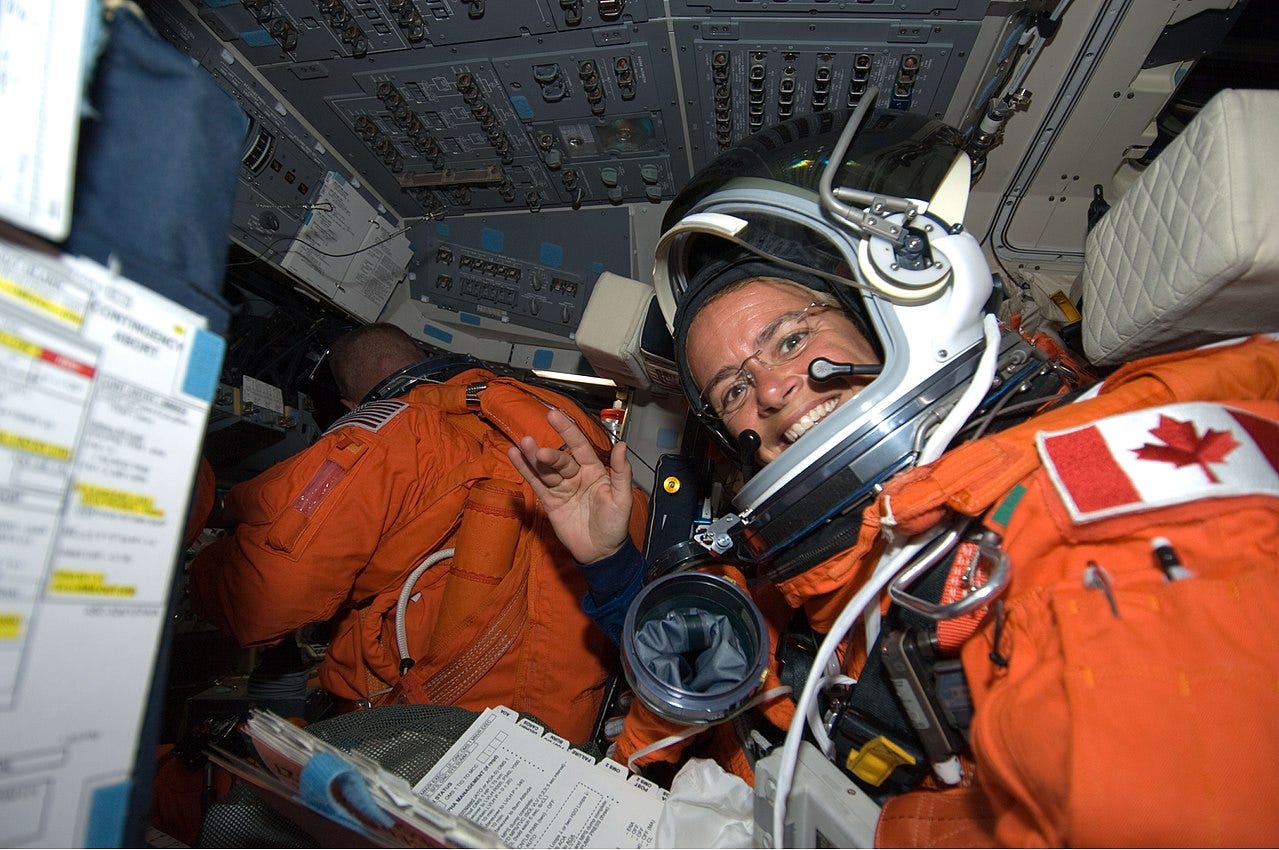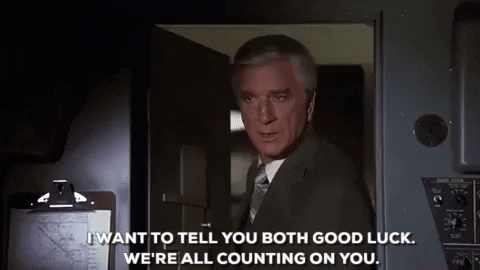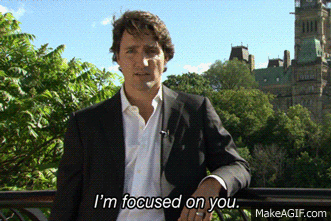Dispatch from The Front Line: Ottawa, you have a problem (the same one as always)
On the danger of normalcy shock in Washington, of PR pretending to be journalism, and a very Trudeau kind of public faceplanting.
Happy Friday, beloved readers of The Line. This week has been a weird one. On the one hand, it seemed to absolutely fly by. On the other, it seemed to span a thousand years. Joe Biden was sworn in only two days ago. The governor-general quit only yesterday. Derek Sloan got the boot from the Tories ... on .... uh ... we don't remember.
Like we said, it's been weird.
The biggest story, of course, is the successful transition to the Biden presidency. It's hard to call a transition guarded by 25,000 troops “peaceful,” but it was at least non-violent. Trump is gone, a remarkably diminished figure (read this Politico story for a deeply reported look at his pathetic final days in office). Biden is in the Oval. We'd like to offer the same wishes to him that we'd offer any other president, of any other party, during their first days in office: Good luck, Mr. President, and God bless America. We are hopeful for your success. The free world needs a strong, stable America.
But don’t get flaky, because we are watching.
We expect that there will be a difficult transition for many in the press as they enter the post-Trump era. With any luck, the next four years will be nowhere near as bonkers-on-steroids as the last four years. The world has operated at the speed of Trump for an entire term, and there will be a very real danger in failing to give President Biden and his team necessary, warranted scrutiny, simply because, well, God, things can't ever be that bad again, right? Can you imagine going from porn stars, Rudy’s runny hair dye and two separate impeachments to a controversy involving some bullshit old yearbook comment from an aide to the postmaster general or something similarly inane?
In a sense, the American press will now experience the same kind of normalcy shock that so often hobbles Canadian public discourse: it's hard to get too angry about genuine Canadian political scandals, when, well ... when all that is happening in America.
But journalistic scrutiny is an essential part of democracy. So we'd like to extend to our American colleagues, and journalists from all over the world covering the White House in foreign bureaus, the same thing we wished for President Biden: good luck. Covering Biden won't pose nearly the same challenges as Trump (his supporters typically won't want to literally murder you, for starters) but that doesn't mean the White House and the Congress doesn't need to be watched closely. That's the job of a journalist, even in relatively good times. The free world is counting on you, too. Don't let the blessed sense of normalcy fool you. We haven't run out of history quite yet.
Related to the above, let's chat about one of those genuine Canadian scandals that seems trivial because it doesn't evolve a narcissist with control of thousands of nuclear weapons whipping up a mob that overruns the U.S. seat of government. Up here in Canada, Julie Payette has resigned as governor-general ahead of the release of a report, or a summary of a report (this is not yet clear), into a toxic workplace environment at Rideau Hall, the governor-general's official residence.
We at The Line have no real opinions about the affair, beyond that some of the details of Payette’s conduct that have been reported are very bizarre and make Payette sound like a completely miserable person to be around. She was clearly unhappy in and ill suited to the job, but, thankfully, our system of government can survive a reportedly grating personality phoning it in while on the clock in a mostly ceremonial office. In the interim, Supreme Court Chief Justice Richard Wagner will serve as an administrator for all the necessary procedural duties, so the government remains fully functional. There's no vacuum. A successor will no doubt be named quickly, given the unsettled times we live in, and will almost certainly prove an upgrade. But in the meantime, we'll keep on keepin' on.
If we had any substantive thought on the entire mess, it's that this is an entirely typical Justin Trudeau flop, isn’t it? It's now abundantly obvious that Payette was not properly vetted, and it's equally obvious why: she was an absolutely perfect candidate for the Liberals, and this prime minister in particular, in terms of her optics. Woman? French-Canadian? Accomplished in a scientific field? High-profile? We at The Line wouldn't be shocked if that's basically the extent of whatever vetting she had. Payette no doubt had Trudeau at "Quebecer lady astronaut."
Because, let's be honest: our image-obsessed prime minister has a genuine talent for political presentation. It's the details of practical execution where he routinely falls flat on his face.
It's an interesting example of where overlapping blindspots produce hilariously dysfunctional results. Too many Canadian conservatives (and especially big-C Conservatives) are so unimpressed, even deeply irritated, by Trudeau's obsession with optics that they forget that he is genuinely good at optics, and that his schtick works with millions of Canadians. This leads Conservatives to consistently underestimate the PM, and lose. The Liberals, meanwhile, particularly those clustered most tightly around the PMO, consistently overestimate the prime minister's charm and the real-world power of the well-written tweet or amazing photo for the 'gram, so they don't do the actual hard work of figuring out good public policy. If they spent a bit more time pondering the steak and a bit less admiring the sizzle, Trudeau and the gang wouldn't have turned "deliverology" into a Canadian political laugh line for the ages.
So this is what we think happened: Trudeau and his advisors got so giddy at the thought of Payette being governor-general that they never stopped to ask around to find out whether she’d be any good at it. Do better next time, Team JT. Screwing up one G-G appointment this badly was an accomplishment, of sorts, but please resist the urge to repeat it.
Your Line editors enjoyed an article that might interest some of you a few days ago. It was passed onto us by a colleague, and a friend of The Line, who herself works in Canadian media. The story was reported in Forbes, and described how a big Silicon Valley tech company cultivated close relationship with journalists ... and then decided it didn't need them anymore.
[A]fter a decade of cultivating journalists over intimate cocktail affairs, the firm has decided it no longer needs them. Instead, a16z is hiring a large editorial team to cover stories about crypto, fintech and other topics with an upbeat slant. ... One reason that a16z became a media outlet is because it can. Once, companies needed to rely on the likes of the New York Times to get their stories out to the public. Those publications, including Fortune, had a virtual monopoly on information because they controlled the bundles — aka newspapers and magazines — through which news got distributed. The Internet blew up that monopoly, slowly at first, and then rapidly once platforms like Twitter, Medium and Substack came on the scene.
The other big reason a16z has turned its back on traditional media is because the firm, like many in the tech world, regards the press as ignorant and unfair. Instead of hailing the many ways tech is changing our lives, these critics say journalists fixate on negative stories, pursuing hit pieces and takedowns that serve their own agenda. What's more, a16z and others would add, reporters are prone to publishing pieces even if they don't know what they're talking about. It's better, then, to leave it to those — like the partners at a16z and their scribes — who do.
The article gets a bit inside-baseball at times, but it's a truly interesting look at a rapidly changing business model — several of them, in fact. It's worth the click.
But for our purposes here, a few thoughts on this, and the future of the media in general.
First of all, the press often is "ignorant and unfair." But that's a feature, not a bug. Certain files require deep, deep reservoirs of understanding and expertise to properly report, it’s true. But big tech, or anything else, shouldn't view an ignorant journalist as a challenge, but as a proxy for the broader public. If you can't find a way to make your stories approachable and engaging — or bluntly, comprehensible — to a reporter, you're never going to get them across to the broader public.
Again, we get it — sometimes you do need a specialist, and if you're desperately trying to get a message out and you can't make the rookie, underpaid 20-something GA reporter sitting across from you understand it, that's frustrating. But if the reporter doesn't get it, the public won't either. Blame the reporter at your peril.
The other lesson here, of course, is that journalism cannot survive this way. Much of the content that a16z produces will probably be fair, engaging and useful. The problem is going to be what happens the first time one of a16z’s crack in-house content producers discovers a story or issue that makes a16z look bad, embarrasses a boss or in any way harms the company's bottom line. Or even when a story isn’t quite upbeat enough. These would-be reporters will find out real quick that they're actually in public relations, not journalism.
This matters, because talented journalists are leaving the industry in droves, seeking the economic stability and vastly better work-life balance of corporate PR and comms gigs. And fair enough! But some of these friends of ours truly seem to believe, or pretend to believe, that they're still doing journalism, just under different management.
That's not how this works. Journalism must, by necessity, be done from the outside, or only through very, very transparent public funding (and even that has real challenges). There’s simply no way you can report on Company X or Industry Y while making your money from Company X in Industry Y. There's a conflict of interest there that can't be avoided, or ignored because it's inconvenient.
And that's a big part of why The Line exists — we see the writing on the wall for legacy media, and we've been very clear with you that we're here to survive the reckoning to come. Our only income comes from reader subscriptions. Which is our roundabout way of asking you to subscribe today. We've had a great few months and hope to reach a sustainable footing by the end of this calendar year (we have a major milestone approaching that we'll report to our subscribers soon in a transparency report we need to get off our asses and finish). But if everyone on our free list became a paying subscriber today, we'd be sustainable instantly and indefinitely.
So please do. It means a lot. And for those who already subscribe, please share our stuff widely, and our encourage others to sign up. Publications like The Line are the future, not PR pretending to be journalism. But the PR guys have all the bucks. That's why we need yours. Please subscribe today.
Round Up:
Christine Van Geyn wrote that Ontario’s new stay-at-home order is putting the police, and public, in a damn tricky spot. The government wrote the order to be deliberately vague and flexible, but then asked the police to go out and enforce it. “We should all be concerned about what will happen when police and individuals disagree about what is truly ‘essential’ under the stay at home order,” she wrote. “Especially since we know random street checks, even when done under the pretence of broken tail lights, have a disproportionate impact on minority communities.” She’s right.
Ken Boessenkool brought The Line some exclusive polling, and it sure is interesting: it turns out a carbon-tax-based climate-change plan would be a net-vote winner for the Conservatives … even in the west. “All Canadians are already paying a carbon tax — either to Ottawa or to their provincial government. The Supreme Court will soon affirm this arrangement,” said Boessenkool. “Erin O’Toole should not unravel all of this. Rather, he should find ways to tweak it — making it fairer to rural Canadians and families with children, for example — as part of a credible and comprehensive Conservative climate-change plan. That kind of plan — even one with a carbon tax — is a winning strategy in critical suburbs around Toronto and does not risk seats in his western bastion.”
In his first piece at The Line, Rahim Mohamed wrote from his new home in Kentucky, where even some lefties are worried what will happen now that Mitch McConnell has been demoted. “[For] a small, poor, and out-of-the-way flyover state like Kentucky,” Mohamed said, “a powerful S.O.B. in Washington is nothing to sneeze at. Despite falling solidly into the Democratic fold myself, I must admit that I felt mixed emotions following the Senate runoff elections in Georgia earlier this month. With McConnell’s demotion to Senate minority leader, I can expect to see Kentucky receive much less attention in the national media.” And, he notes, probably a lot less federal pork, too.
Jen Gerson closed out the week for us with some free advice for Erin O’Toole: find the fringe elements in your party and destroy them without mercy. “The storming of Washington offered conservatives around the world an opportunity, and they should take it,” Gerson argued. “We at The Line here are biased as all hell, but we are strictly non-partisan. So believe me when I say that I’m offering this advice to the CPC not because I have a stake in the party, but rather because a Conservative party beholden to conspiracy theorists and wingnuts is bad for the country. That should be obvious to everybody by now.”
It should be. But it probably isn’t.
Anyway, that’s it from us this week, Line readers. Please subscribe if you haven’t, share our stories if you have, and in any case, take care of yourselves. We’ll be back with more on Monday.
The Line is Canada’s last, best hope for irreverent commentary. We reject bullshit. We love lively writing. Please consider supporting us by subscribing. Follow us on Twitter @the_lineca. Fight with us on Facebook. Pitch us something: lineeditor@protonmail.com





Taking inventory of Justin Trudeau's strengths vs. weaknesses and successes vs. failures over the years, it's increasingly clear that he would have been an amazing Governor General, rather than a well-intentioned but emphatically mediocre Prime Minister. He's just not an execution guy. It seems like he cares much more about the idea of good government than practicing good governance. Kind of like the gymbro who fixates on upper-body exercises Because Beach Season Is Coming, ignoring the fact that some of the largest and most important muscles are in the lower body.
Lorrie Goldstein pretty much said the same thing
https://torontosun.com/opinion/columnists/goldstein-the-conservatives-biggest-wounds-are-self-inflicted